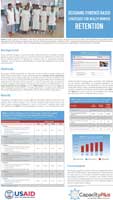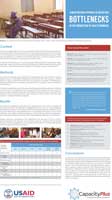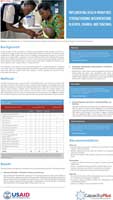
Sharing Health Workforce Findings and Strengthening the Field of Health Systems Research
At the Second Global Symposium on Health Systems Research in Beijing, 1,775 participants from 110 countries reviewed new findings and discussed how to strengthen the field. CapacityPlus joined the discussions and presented selected findings from research on the global health workforce:
 Designing Evidence-Based Incentive Strategies for Health Worker Retention. Many countries struggle to attract and retain sufficient numbers and types of health workers to provide quality services in rural and remote areas. Ministries of health often rely on external partners to develop the evidence base for formulating retention strategies, use less rigorous methodologies, or forego data altogether when making policy decisions. This poster describes two new tools—the Rapid Retention Survey Toolkit and the iHRIS Retain costing tool for retention interventions—and related results from Ministry of Health surveys in Lao People’s Democratic Republic and Uganda. The findings suggest a number of effective strategies to attract and retain health workers. They demonstrate the importance of using rigorous, yet practical, methods to gather data on motivational preferences to determine how health workers may respond to implementation of financial and nonfinancial incentives, and the cost implications, as an important input to evidence-based policy-making.
Designing Evidence-Based Incentive Strategies for Health Worker Retention. Many countries struggle to attract and retain sufficient numbers and types of health workers to provide quality services in rural and remote areas. Ministries of health often rely on external partners to develop the evidence base for formulating retention strategies, use less rigorous methodologies, or forego data altogether when making policy decisions. This poster describes two new tools—the Rapid Retention Survey Toolkit and the iHRIS Retain costing tool for retention interventions—and related results from Ministry of Health surveys in Lao People’s Democratic Republic and Uganda. The findings suggest a number of effective strategies to attract and retain health workers. They demonstrate the importance of using rigorous, yet practical, methods to gather data on motivational preferences to determine how health workers may respond to implementation of financial and nonfinancial incentives, and the cost implications, as an important input to evidence-based policy-making.
 A Mixed Method Approach to Identifying Bottlenecks in the Production of Health Workers. Provision of quality health services starts with health workers and the training they receive. Given resource limitations, it is essential to ensure that investments in preservice education are the most efficient and effective in producing quality health workers. This poster describes results from a needs assessment at six institutions in Mali using a mixed method approach to identify the key bottlenecks to providing quality preservice education in family planning and reproductive health for nurses and midwives. Results will be used to develop and cost a performance plan to adapt the family planning and reproductive health curricula and address gaps in training and infrastructure at each of the six institutions. This approach to assessing barriers to the training and production of health workers can be applied to other training institutions in Africa and beyond.
A Mixed Method Approach to Identifying Bottlenecks in the Production of Health Workers. Provision of quality health services starts with health workers and the training they receive. Given resource limitations, it is essential to ensure that investments in preservice education are the most efficient and effective in producing quality health workers. This poster describes results from a needs assessment at six institutions in Mali using a mixed method approach to identify the key bottlenecks to providing quality preservice education in family planning and reproductive health for nurses and midwives. Results will be used to develop and cost a performance plan to adapt the family planning and reproductive health curricula and address gaps in training and infrastructure at each of the six institutions. This approach to assessing barriers to the training and production of health workers can be applied to other training institutions in Africa and beyond.
 Successes and Challenges: Implementing Health Workforce Strengthening Interventions in Kenya, Uganda, and Tanzania. Human resources for health (HRH) is a relatively young field. As such, less is known about how to successfully implement health workforce interventions than is known about other types of health interventions (e.g., service delivery) with a longer history of implementation. This poster describes results from a qualitative study with staff from USAID-funded HRH projects in Kenya, Uganda, and Tanzania led by IntraHealth International. The study was conducted in recognition of the need for a more systematic approach to understanding the challenges and success factors in implementing HRH interventions. Three key themes emerged as critical factors in the successful implementation of HRH interventions: advocacy (perception, champions, evidence, and data use); partnerships (identification, representation, coordination, and government); and technical expertise (recruitment, capacity-building, and retention).
Successes and Challenges: Implementing Health Workforce Strengthening Interventions in Kenya, Uganda, and Tanzania. Human resources for health (HRH) is a relatively young field. As such, less is known about how to successfully implement health workforce interventions than is known about other types of health interventions (e.g., service delivery) with a longer history of implementation. This poster describes results from a qualitative study with staff from USAID-funded HRH projects in Kenya, Uganda, and Tanzania led by IntraHealth International. The study was conducted in recognition of the need for a more systematic approach to understanding the challenges and success factors in implementing HRH interventions. Three key themes emerged as critical factors in the successful implementation of HRH interventions: advocacy (perception, champions, evidence, and data use); partnerships (identification, representation, coordination, and government); and technical expertise (recruitment, capacity-building, and retention).
As part of the symposium, Wanda Jaskiewicz participated in an invitation-only satellite session hosted by the Centers for Disease Control and Prevention. The group reviewed preliminary results of the Health Care Provider Performance Review—a systematic review of strategies to improve health worker performance in low- and middle-income countries—and provided feedback on the methodological approaches. The purpose of the review is to compile a library and publicly-accessible database of studies related to improving health worker performance for researchers and policy-makers, prepare a report and summary articles on effectiveness and cost of strategies, and develop evidence-based policy recommendations and a research agenda. Results will be disseminated in 2013.
The Beijing Statement from the Second Global Symposium on Health Systems Research cited several action points that emerged from the gathering, along with key ideas for follow-up steps. The Third Global Symposium will be scheduled for 2013 in South Africa or Canada.
Related items:


